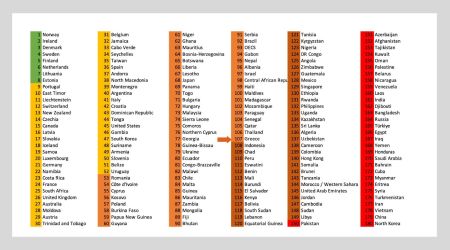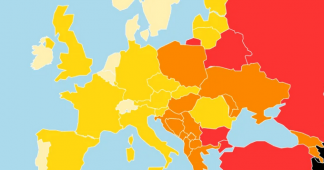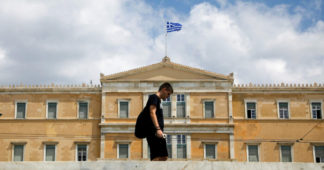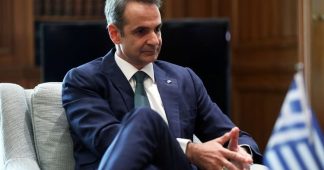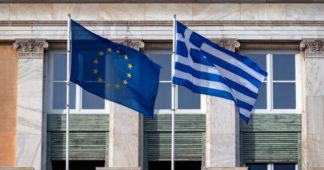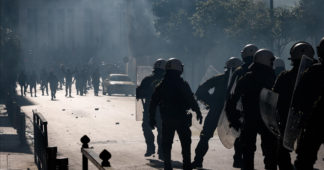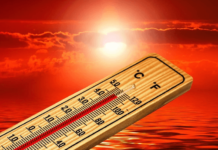May 4, 2023
For a second year in a row, Greece ranks as the worst EU country for media freedom. According to Reporters Without Borders 2023 Press Freedom Index released on Wednesday, Greece ranks 107th in the world, even below Qatar and Thailand.
For a second year in a row, Greece ranks as the worst EU country for media freedom. According to Reporters Without Borders 2023 Press Freedom Index released on Wednesday, Greece ranks 107th in the world, even below Qatar and Thailand.
Norway ranks 1st, Ireland ranks 2nd and Denmark 3rd. At the bottom of RSF’s index are Vietnam (178th), China (179th) & North Korea (180th).
The 21st edition of the World Press Freedom Index, compiled annually by Reporters Without Borders (RSF), sheds light on major and often radical changes linked to political, social and technological upheavals.
According to the 2023 World Press Freedom Index – which evaluates the environment for journalism in 180 countries and territories and is published on World Press Freedom Day (3 May) – the situation is “very serious” in 31 countries, “difficult” in 42, “problematic” in 55, and “good” or “satisfactory” in 52 countries. In other words, the environment for journalism is “bad” in seven out of ten countries, and satisfactory in only three out of ten.
Europe, especially the European Union, is the region of the world where it is easiest for journalists to work, but the situation is mixed even there. Germany (21st), where a record number of cases of violence against journalists and arrests have been recorded, has fallen five places. Poland (57th), where 2022 was relatively calm from a press freedom viewpoint, has risen nine places, while France (24th) has risen two. Greece (107th), where journalists were spied on by the intelligence services and by powerful spyware, continues to have the EU’s lowest ranking.
GREECE
Press freedom in Greece suffered severe setbacks between 2021 and 2023, including with a wiretapping scandal that revealed the National Intelligence Service (EYP) was spying on several journalists. Furthermore, SLAPPs (Strategic Lawsuit Against Public Participation) are commonplace, and, even more troubling, the murder of veteran crime reporter Giorgos Karaïvaz in 2021 has never been solved.
Media landscape
The population’s trust in the media has been one of the lowest in Europe for many years. A few large private groups like Alter Ego Media coexist alongside hundreds of online media outlets, which contributes to a high fragmentation of the media landscape. Similarly, a few entrepreneurs run an overwhelming majority of media outlets, while being involved in other highly regulated business sectors. Some of them have close ties to the country’s political elite. As a result, the press is very polarised.
Political context
The government spokesman is responsible for overseeing the public media, putting the latter’s editorial independence at risk. The broadcast regulator, National Council for Radio and Television (NCRTV), accused of being slow and inefficient, has not been significantly overhauled by the current government or the previous one. Overseen by the prime minister, the National Intelligence Service (EYP) was involved in the surveillance of journalists, many of whom were targeted by the Predator spyware.
Legal framework
Despite constitutional guarantees, press freedom has been challenged on the legislative level. New legislation passed by parliament, meant to provide citizens with better protection against arbitrary surveillance, in response to the “Predatorgate” wiretapping scandal, fall short of European standards. A new media bill established a controversial ethics committee. However, earlier amendments to the criminal code that allowed for a disproportionate restriction of press freedom on dubious legal grounds were eventually repealed.
Economic context
The financial crisis of the last decade, combined with declining readership and advertising budgets, has called into question the long-term survival of many media outlets. The impact of the new legislation aimed at increasing transparency of media ownership and funding remains to be seen.
Sociocultural context
Extreme left and extreme right activists regularly attack the premises of the media they consider as ideological enemies. In addition, female journalists are frequently faced with sexism in the workplace.
Safety
The police regularly resort to violence and arbitrary bans to hamper journalistic coverage of demonstrations and the refugee crisis on the islands. Police filed criminal charges against a prominent photojournalist arrested while covering a police operation in Athens. Another journalist who was a victim of unjustified police violence, only won his case in court after 12 years. Despite promises of a swift investigation, the authorities have so far failed to resolve the murder of veteran crime reporter Giorgos Karaïvaz, who was gunned down outside his Athens home in broad daylight. However, concrete solutions are expected from a working group on the protection of journalists, the RSF notes in its Greece section.
It should be recalled that Greece has plunged dozens of Index positions in the last couple of years.
We remind our readers that publication of articles on our site does not mean that we agree with what is written. Our policy is to publish anything which we consider of interest, so as to assist our readers in forming their opinions. Sometimes we even publish articles with which we totally disagree, since we believe it is important for our readers to be informed on as wide a spectrum of views as possible.
